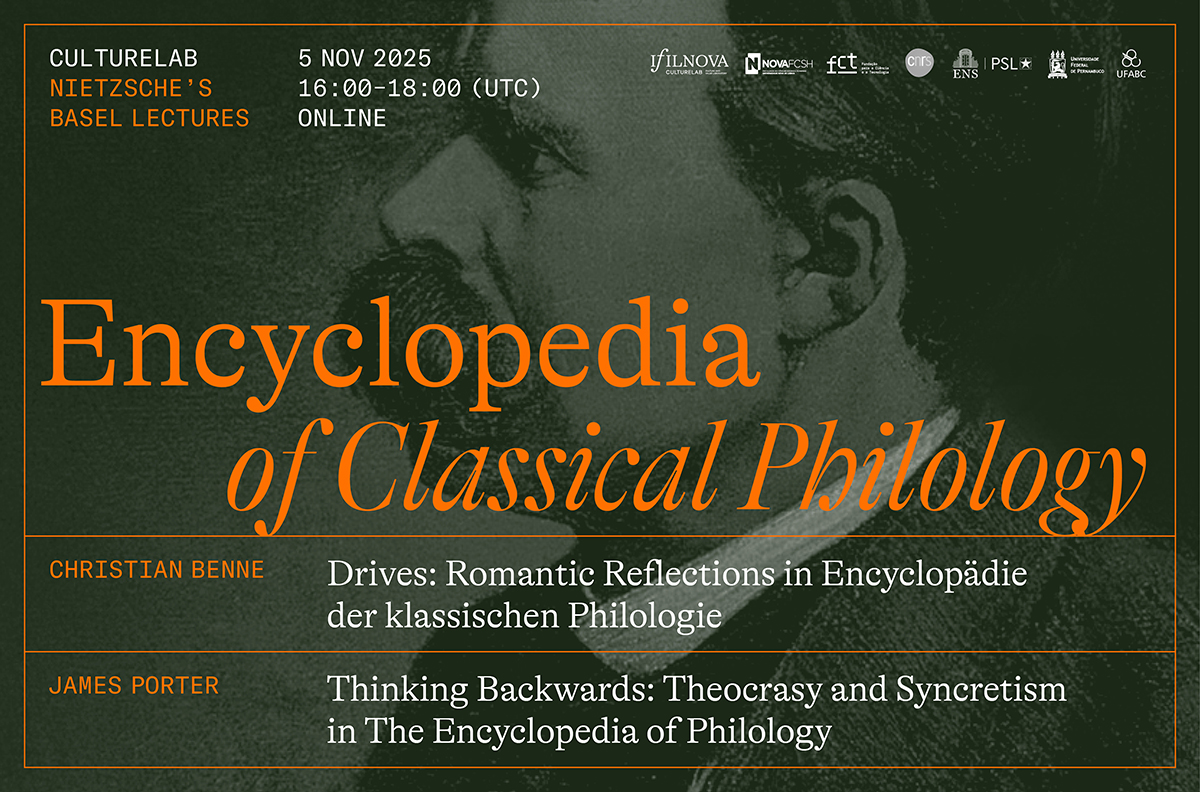Christian Benne & James Porter

The third session of the International Seminar Nietzsche’s Basel Lectures will be dedicated to the theme Encyclopedia of Classical Philology and will take place online on 5 November 2025 (Wednesday), from 16:00 to 18:00 (UTC). The session will be led by Christian Benne, with a presentation entitled “Drives: Romantic Reflections in Encyclopädie der klassischen Philologie”, and James Porter, who will speak on “Thinking Backwards: Theocrasy and Syncretism in The Encyclopedia of Philology”.
Drives: Romantic Reflections in Encyclopädie der klassischen Philologie
Abstract: The genre of the modern philological encyclopedia is a child of (philosophical) romanticism. Nietzsche’s mature philosophical project saw itself as overcoming romanticism, while still making use of many of its motifs and ploys. I would like to discuss the romanticism of Nietzsche’s Encyklopädie first in relation to its notion of drives. From the basis of this analysis, I would like to discuss the presence of central elements of Nietzsche’s later thought in this lecture. I am particularly interested in the notion of hermeneutics and criticism and how they shed light on Nietzsche’s theory of interpretation.
Bio: Christian Benne is professor of European literature and intellectual history at the University of Copenhagen. He is General Editor of ‘Orbis Litterarum’ and Member of the Academia Europaea. He has worked and published extensively on Nietzsche. Among many other things he was, until last year, deputy director of the Nietzsche Foundation and now serves on the board of the Foundation Nietzsche Haus in Sils Maria.
Thinking Backwards: Theocrasy and Syncretism in The Encyclopedia of Philology
Abstract: Section §19 of Encylopädie der klassischen Philologie und Einleitung in das Studium derselben (“Über Religion und Mythologie der Alten”) offers an unexpected commentary on the contemporaneous work, Die Geburt der Tragödie. My hope is for the presentation to be a seminar-style discussion around a close reading of KGW 2.3: 413–18 (passages as marked), with special attention to n. 37 and its strangely anachronistic details and unmistakably Hegelian phraseology. There is much to ponder here. What emerges from these pages is an anti-classical and romanticizing picture of the Dionysian realm, which is colored by a chronological emphasis that stems from the anti-classical Greek historian of the Alexandrian period, J. G. Droysen—at least on the surface. Beneath the surface, Nietzsche is, I believe, exposing all projections of modernity onto the classical past, in the guise of recommending them. See his earlier pedagogical section §6, which begins, “Wie wird der Philolog?” and which answers the question with a controversial set of instructions that add up to the following: To be a classical scholar, one must cultivate and embrace one’s irreparable modernity. The question carries implications for how we might re-read GdT, especially if we start out from a further question: Is religion at bottom anything other than a form of mythology?
Bio: James I. Porter is Professor of Rhetoric at UC Berkeley. He has published two book on Nietzsche (Nietzsche and the Philology of the Future and The Invention of Dionysus: An Essay on ‘The Birth of Tragedy’, both Stanford, 2000), numerous articles and chapters on Nietzsche, and the edited collection, Nietzsche and Literary Studies (Cambridge, 2024). He is currently co-editing a Cambridge Critical Guide to ‘The Birth of Tragedy’ with Michael Forster.
About the seminar
It is now widely accepted among experts on Nietzsche’s work that his Basel lectures are essential to a proper understanding of the development of his thinking. Now that the lectures have been published in the critical edition of the complete works, it is necessary to study their sources and the methods used in them, as well as their philological and philosophical content. Despite this, they remain largely unexplored. While some relevant research has emerged, it has focused mainly on specific lectures. There is therefore still a need for research that covers all the lectures, studies them systematically and in their interrelationships, looking for differences and similarities and seeking to determine to what extent decisive aspects of what distinguishes Nietzsche’s thought are already present in them or not. This seminar aims to be a first contribution to filling this gap. It will consist of ten monthly sessions. Each session will focus on one of the series of lectures and its key topic. And it will feature two speakers. The seminar format, with its discussion among all participants after each presentation, is a fruitful model for a project of this kind. Attendance to each seminar session must be preceded by registration through one of the organisers, who will provide the respective link (carlottasantini@hotmail.it, enasser@uol.com.br, plima@fcsh.unl.pt). For more information, see the full seminar programme below.
Org. Carlotta Santini (CNRS/ENS, Paris), Eduardo Nasser (UFPE/UFABC), Paulo Lima (IFILNOVA/NOVA FCSH)
Next sessions
16 December 2025 (exceptionally on Tuesday), 16:00–18:00 (UTC)
Christian Wolleck, “A Philosopher Talks About Grammar: On the Philosophical Implications of a Philological Stint”
Marina Silenzi, “Instinct, Shout and Mimicry: Toward a Genealogy of Language”
Session 5: The Pre-Platonic Philosophers
21 January 2026 (Wednesday), 16:00–18:00 (UTC)
André Laks, “Two strategies in tension?”
Helmut Heit, “The Pre-Platonic Philosophers”
18 February 2026 (Wednesday), 16:00–18:00 (UTC)
João Constâncio, “Nietzsche on Plato’s Phaedrus and the Question of Writing”
Pieter De Corte, “Nietzsche on Plato’s Political Thought in the Basel Lectures”
18 March 2026 (Wednesday), 16:00–18:00 (UTC)
Luca Lupo, “Saying Yes: The Doctrine of Assent”
Stefano Busellato, TBD
15 April 2026 (Wednesday), 16:00–18:00 (UTC+1)
Rogerio Lopes, “Much Ado About (Almost) Nothing: How to Avoid Philosophical Inflation of Genealogical Claims”
Aritz Pardina Herrero, “F. Nietzsche’s Rhetoric Lectures: Dating and Interrelationship (and Why These Are Important)”
13 May 2026 (Wednesday), 16:00–18:00 (UTC+1)
Sotera Fornaro, TBD
Enrico Mueller, TBD
17 June 2026 (Wednesday), 16:00–18:00 (UTC+1)
Gemma Adesso, “The Art of Reading and Writing”
Rafael Carrión Arias, “History of Greek Literature from 1874-76: The Origins of Genealogical Method in F. Nietzsche”

